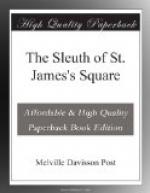He got on his feet, and my father saw that the man was in liquor. He was not drunken, but the effect was on him with its daring and its indiscretions.
It was an April morning, bright with sun. The world was white with apple blossoms, the soft air entered through the great open windows. And my father thought that the liquor in the man had come with him out of a night of bargaining or revel.
Morrow put his hands on the table and looked at Zindorf ; then, suddenly, the laughter in his face gave way to the comprehension of a swift, striking idea.
“Why, man,” he cried, “it’s the devil’s truth! Everything about you is a negation! You ought to be a priest by all the lines and features of you; but you’re not. . . Scorch me, but you’re not!”
His voice went up on the final word as though to convey some impressive, sinister discovery.
It was true in every aspect of the man. The very clothes he wore, somber, wool-threaded homespun, crudely patched, reminded one of the coarse fabrics that monks affect for their abasement. But one saw, when one remembered the characteristic of the man, that they represented here only an extremity of avarice.
Zindorf looked coldly at his guest.
“Mr. Lucian Morrow,” he said, “you will go on, and my price will go on!”
But the young blood, on his feet, was not brought up by the monetary threat. He looked about the room, at the ceiling, the thick walls. And, like a man who by a sudden recollection confounds his adversary with an overlooked illustrative fact, he suddenly cried out:
“By the soul of Satan, you’re housed to suit! Send me to the pit! It’s the very place for you! Eh! Zindorf, do you know who built the house you live in?”
“I do not, Mr. Lucian Morrow,” said the man. “Who built it?”
One could see that he wished to divert the discourses of his guest. He failed.
“God built it!” cried Morrow.
He put out his hands as though to include the hose.
“Pendleton,” he said, “you will remember. The people built these walls for a church. It burned, but the stone walls could not burn; they remained overgrown with creeper. Then, finally, old Wellington Monroe built a house into the walls for the young wife he was about to marry, but he went to the coffin instead of the bride-bed, and the house stood empty. It fell into the courts with the whole of Monroe’s tangled business and finally Zindorf gets it at a sheriff’s sale.”
The big man now confronted the young blood with decision.
“Mr. Lucian Morrow,” he said, “if you are finished with your fool talk, I will bid you good morning. I have decided not to sell the girl.”
The face of Morrow changed. His voice wheedled in an anxious note.
“Not sell her, Zindorf!” he echoed. “Why man, you have promised her to me all along. You always said I should have her in spite of your cursed partner Ordez. You said you’d get her some day and sell her to me. Now, curse it, Zindorf, I want her . . . I’ve got the money: ten thousand dollars. It’s a big lot of money. But I’ve got it. I’ve got it in gold.”




